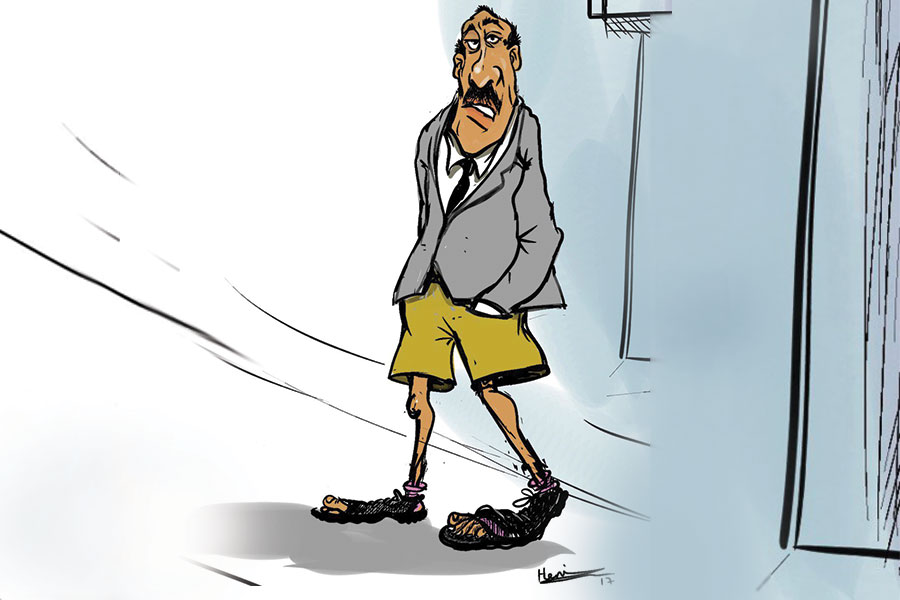
May 31 , 2025. By RUTH BERHANU ( FORTUNE STAFF WRITER )
The looming tuition hike at elite schools such as Flipper and Sandford schools has left parents reeling with disbelief and frustration. Despite schools' officials attributing rises in fees to infrastructure and salary improvements, parents contend that promised renovations remain unrealised. The sudden leap in fees, without the previously announced increments, stirs concern among parents who feel blindsided, reports Ruth Berhanu, Fortune Staff Writer.
Parents at Flipper International School received a jolt on May 23, 2025, when a letter confirmed that next year’s “Category 1” tuition will increase to 178,558 Br, a 76,525 Br leap equivalent to roughly 75pc.
One father, who asked for anonymity, had expected “a gradual rise” over five years, as earlier notices suggested. Instead, the full increase takes effect at registration for the 2025/26 school year and will remain for 2026/27.
“It’s not just the fee rise that worries me,” he said. “The school has not delivered on the infrastructure it promised, and teachers’ salaries have not been raised as they said they would.”
A sense of broken promises sharpens the father’s anger. School managers attributed the phased rise to the addition of new classrooms, a refurbished laboratory, and higher teacher salaries. While teacher's salaries have been raised, parents say, other promises failed to materialise.
“How can they demand an extra 76,000 Br when nothing on the ground has moved?” he wondered.
The dispute dates back to the Ministry of Education’s decision to revise a 2016 directive governing school licensing and renewals. On February 12, the Ministry told officials of the Education & Training Authority (ETA) that the directive had to be amended to make licensing more transparent.
A new clause defines a tuition-fee increase as any “extra charge” on top of the previous year’s bill. It excludes “harmonisation”, the levelling of fees within the same grade. The change is supposed to take effect once it is published on the websites of both the Ministry and the Authority.
Under the federal rule-making procedure, every directive should appear online with the signatures of the Justice and Education ministers before it can be enforced. A link to the amended text did go live on January 17 this year, but it carried no names.
Federal legislators serving on the Standing Committee for Human Resource Development, Employment, and Technology Affairs state that the omission, coupled with the lack of an implementation guide, is in itself sufficient to nullify the rule and violates a constitutional provision that requires all new laws to respect fundamental rights.
The Standing Committee deepened the confusion by advising both federal agencies on March 24 not to apply the rewritten rule. MPs argued that no directive formally titled “General Education Sector Schools Licensing Directive” had existed before. They deemed amending it improper.
They noted that the Ministry had swapped directives 992/2016 for a new text and 1037/2025, without meeting a law issued in 2012, which requires concise and clear drafting. They concluded that the new text conflicts with higher laws and should not be enforced.
Flipper has pressed ahead regardless. According to its General Manager, Getaneh Asfaw, ETA sent the school the latest directive “1037” issued this year, directing it to harmonise fees across campuses.
Under Flipper’s plan, 1,934 students in Categories 1-4 would merge into Category 5, which already holds 1,135 pupils. All new entrants would also be placed in Category 5. The first draft lifted fees by more than 100pc, but after ETA intervention, the school trimmed the figures and, on May 23, told parents that registration based on the revised amounts would start three days later.
Numbers in the harmonisation plan are evident. Category 1 now covers 279 students, Category 2 another 322, Category 3, 210 pupils, and Category 4, 203 students. Parents argue that rolling everyone into Category 5 would leave three-quarters of Flipper’s 3,069 pupils paying more.
The meeting minutes of the Parents' and Teachers’ Association (PTA) indicate that the first sketch was shared with parents on April 7, and a detailed draft followed on May 3. They rejected an initial 12-month transition, prompting the school to offer two years, but then abruptly returned to a shorter timetable in its registration letter.
Representatives of the Association insist they never agreed. Four meetings involving the school, ETA and parents produced no consensus. Flipper initially wanted harmonisation within a single year, but then stretched it to two.
“We can’t force the school to decrease the prices,” said Mekdes Derese, ETA lead executive officer. “The only thing we can do is give options that could satisfy both sides.”
Parents have split into two online petitions. One, signed by 259 from Categories 1-3, accuses the school of pushing the plan “without transparency, adequate consultation, or consideration of parents’ concerns.” They demanded a pause in registration. Another, backed by 34 parents from Categories 4-5, found the proposal “a fairer and more transparent fee structure” that removes long-standing disparities.
A parallel story has long simmered at Sandford International School.
Formerly Sandford English Community School, it rebranded in 2001, adopted the International Baccalaureate programme, and split into primary, secondary and adult evening sections. Its governing board once had nine members, but now operates with six after resignations and a dismissal.
The nine-member body once included Kalkidan Arega from Toppan Gravity; Mekuria Getachew, a diplomat; Teshome Worku from the Authority for Civil Society Organisations, and parents such as Kumelachew Dagne and Sozit Ture. Kalkidan and Kumelachew have since resigned, and Sozit was removed, leaving the chair to Biruk Haile (PhD), Melody Kelemu, Belay (who replaced Teshome), a new foreign-affairs delegate, a parent with foreign nationality and one national parent.
A two-thirds quorum that still hears complaints but, parents say, seldom acts on them.
For Atsedemariam Gebresilasse, mother of a first-grader, the real hardship is the exchange rate. When her son was in nursery, she paid 50 Br for the dollar. The rate rose to 75 Br the next year and to 123.80 Br in 2024.
“Every term is a stress as the dollar value increases,” she told Fortune. “There are parents who are denied a report card for not paying in the prevailing exchange rate.”
In 2015, Sandford decided to quote all fees in US Dollars from the second term of 2015/16, allowing nationals to pay in Birr at the prevailing exchange rate. Parents protested to the Ministry in May 2016, but the policy stood. In May 2022, the ETA issued a directive banning what its officials characterised as “dollarisation” of school fees, insisting that all school payments be made in Birr.
Nonetheless, Sandford’s management continued to bill in dollars and raised fees again.
The Authority pushed back on February 20, 2025, protesting that the rise breached a directive (992) issued in 2024, which repeats the Birr-only rule. After complaints reached Parliament, the Standing Committee pushed education authorities to compel Sandford’s administration to renew the school’s license and curriculum and adjust the staffing ratio to 70pc Ethiopian nationals by June 7, 2025.
It also instructed the Federal Auditor-General to submit a financial audit for 2022-24 by July 7.
“If Sandford International School does not renew its licence or curriculum by June 7, 2025, we’ll take administrative measures,” Mekdes warned.
Sandford has its harmonisation plan, though. Until recently, fees fell into four brackets: C1 national (279 students), C2 national (322), C3 international (210) and C4 national (203). Its management, to the aggravation of several parents, proposed folding everyone into C4 and setting the fees in dollars. Parents have responded with a lawsuit.
According to Abdurazak Nesro, a legal consultant and trainer with 15 years of experience, and working for the local chapter of Transparency International, a law passed by Parliament in 2012 is explicit in stating that domestic transactions should be in Birr unless both parties agree otherwise. Because ETA oversees Sandford, he argued, any directive allowing foreign-currency fees contradicts the law and is void.
“In the national legal hierarchy, a directive cannot override a proclamation,” he said, warning that officials could face liability for ignoring the rule.
Managers of Sandford International School declined to comment, despite repeated attempts by this newspaper to obtain a response.
However, behind the legal jargon lies the question of affordability in an economy where inflation erodes wages and the Birr's value relative to major currencies, including the Dollar, diminishes purchasing power. Some parents with students at Flipper International contemplate moving their children, while others would cut their household budgets.
Editors' Note: This article has been amended from its original form on June 09, 2025.
In the original article we erroneously reported that “parents at Flipper International School received a jolt on May 26, 2025, when a letter confirmed that next year’s “Category 1” tuition fee will increase to 178,558 Br, a 76,525 Br leap equivalent to roughly 75pc.” The actual has been amended May 23, 2025.
We have also quoted a parent who claims that “the school has not delivered on the infrastructure it promised, and teachers’ salaries have not been raised as they said they would.” We were able to verify that a salary increase was implemented. The passage has been amended to “While teacher's salaries have been raised, parents say, other promises failed to materialise.”
We would also like an assertion that a "category one now covers 279 national students, Category 2 another 322, Category 3, 210 international pupils, and Category 4, 203 nationals," to be corrected, that Flipper does not classify students into national and international payment categories. Lastly, we incorrectly identified Atsedemariam Gebresilasse as the "mother of a first-grader" at Flipper International School. We have wrongly attributed her to Flipper, while she sends her children to Sanford International, the other school mentioned in our story.
Our publication adheres to a policy of promptly correcting any errors discovered in reporting, editing, or design. We do apologise for the error.
PUBLISHED ON
May 31,2025 [ VOL
26 , NO
1309]

Photo Gallery | 147659 Views | May 06,2019

Photo Gallery | 137754 Views | Apr 26,2019

My Opinion | 134416 Views | Aug 14,2021

My Opinion | 130982 Views | Aug 21,2021

Aug 30 , 2025
For Germans, Otto von Bismarck is first remembered as the architect of a unified nati...

Aug 23 , 2025
Banks have a new obsession. After decades chasing deposits and, more recently, digita...

Aug 16 , 2025
A decade ago, a case in the United States (US) jolted Wall Street. An ambulance opera...

Aug 9 , 2025
In the 14th Century, the Egyptian scholar Ibn Khaldun drew a neat curve in the sand....